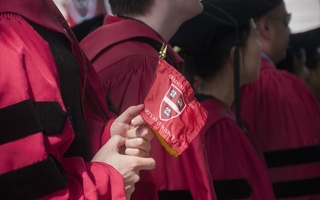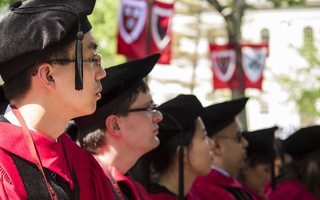{shortcode-978a119e053c5e4f4087479a24429769055a73a9}The unprecedented federal tax on university endowments will likely have a "pretty significant" impact on Harvard's ability to fund certain initiatives, though it is unlikely to change Harvard's investment strategy, University President Drew G. Faust said in an interview earlier this month.
The new tax—passed by Congress in December—requires universities with endowments greater than $500,000 per full-time student to pay 1.4 percent on investment gains. Harvard is among the 35 schools that could pay tens of millions in total taxes per year. According to an estimate by University Provost Alan M. Garber ’76 last November, Harvard would have paid $43 million if the tax was in effect in 2017.
According to some business professors, the Harvard Management Company—stewards of the University’s $37.1 billion endowment—is unlikely to alter its investment strategy given the relatively low tax rate. While Faust said she didn’t expect the tax to have a “gigantic impact” on the University’s investment strategy, she said the tax will “have a big impact on what those investments are able to fund."
“What [the endowment tax] will do is put constraints on our ability to fund the variety of undertakings that are central to our mission—financial aid and research, public programs, the variety of endeavors across the University," Faust said. “Its ultimate impact will be on limiting the growth in the endowment, and the growth in the endowment is what funds the programs.”
In 2017, the University gave over $561 million in total scholarships and other student awards.
Faust said that since each of the University's schools have "differential dependence on the endowment," the excise tax will impact each school differently.
Faust said the Divinity School, which relies heavily on the endowment, would be most affected. The School of Public Health—whose operating budget depends more on annual grants from NIH and other government agencies than on the endowment— would be among the least affected schools.
According to the University financial report for fiscal year 2017, 73 percent of the Divinity School’s operating budget comes from endowment income, compared to only 16 percent for the School of Public Health. In 2017, Divinity School expenses totaled $41.7 million.
Faust said the effect of the tax on the Faculty of Arts and Sciences—which includes Harvard College—would also be “significant.” In 2017, 52 percent of the operating revenue for the Faculty of Arts and Sciences was funded by the endowment.
In an interview last month, Dean of the Faculty of Arts and Sciences Michael D. Smith said he is wary of committing to long-term projects while the full impact of the tax is still unknown.
“It will have an impact on us,” Smith said. “It is taking money we could’ve used for academic programs, could've used for financial aid, could've used for a bunch of other things we try to accomplish here.”
—Staff writer William L. Wang can be reached at william.wang@thecrimson.com. Follow him on Twitter @wlwang20.
Recommended Articles
-
 With Looming Tax Bill, Grad Students Escalate Advocacy
With Looming Tax Bill, Grad Students Escalate Advocacy -
 Grad Students Relieved Tuition Provision Out of Final Tax Plan
Grad Students Relieved Tuition Provision Out of Final Tax Plan -
In Defense of the ArtsAs the Republican tax bill puts Harvard’s endowment at risk, the University must remember not to neglect the arts.
-
 Faust Joins 48 Higher Ed Leaders Seeking Endowment Tax Repeal
Faust Joins 48 Higher Ed Leaders Seeking Endowment Tax Repeal -
 Faust to Lobby for Endowment Tax Repeal
Faust to Lobby for Endowment Tax Repeal













